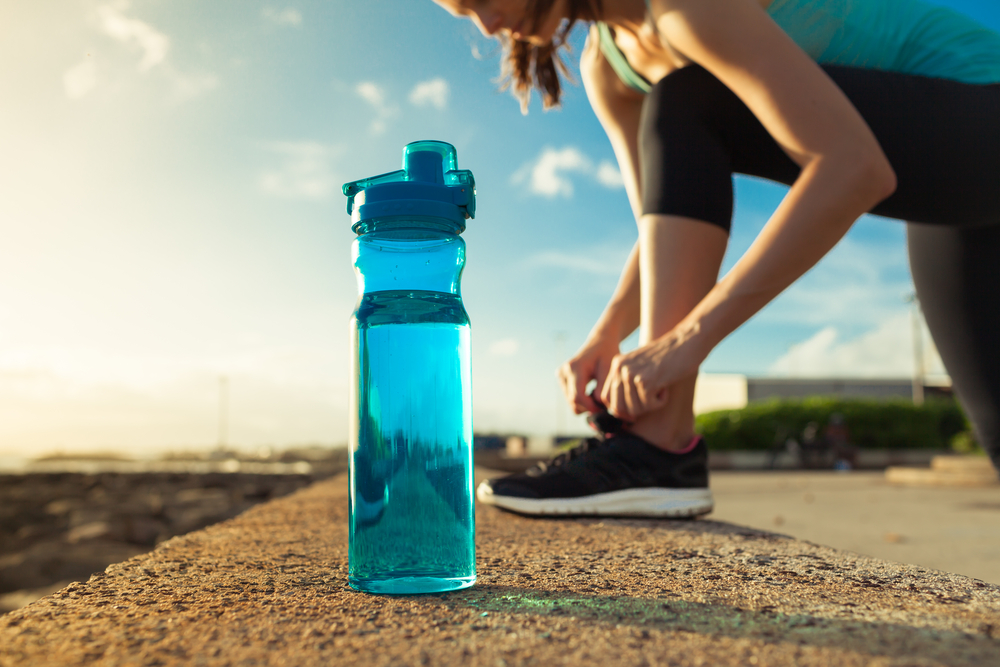
Drinking is vital for human life. Since we sweat when we are doing physical activity and lose fluids as a result, it is essential to take on enough fluids before, during, and after exercising. But how much exactly should you drink as an athlete, what should you drink, and does it really have to be a specialist sports drink or isotonic drink?
How much fluid do our bodies actually need?
We are made up of between 50% and 70% water. Water is needed in the human body as a solvent for metabolic reactions. It also helps the body to release toxins and acts as a means of transport in the circulatory system. Although your body does produce small quantities of water itself, it is recommended that adults drink between 1.5 and 2 liters of fluid every day. Altogether, the body needs 2 to 3 liters of water a day. 1 liter can be absorbed just from the food you eat, meaning you should drink 1.5 to 2 liters of water, tea or juice. Many people find it difficult to take on enough fluids, with most people only drinking when they are thirsty. However, it is important to drink regularly, not just when you become aware that you are thirsty. This is even more important for people doing exercise. But how do our fluid requirements change when we are doing sport?
How much should athletes drink?
Nutrition experts say that physical activity further increases the amount of fluids needed. After all, athletes sweat, causing them to lose fluids and minerals. Athletes need between 1 and 4 liters of fluids. Naturally, it depends on the intensity and duration of the exercise, and on the surrounding temperature. In order to avoid risking levels of fluid depletion that the body is no longer able to compensate for, it is important to drink regularly. You should drink something every 15 to 20 minutes. If you do not and you lose 2% of your body weight in fluids, this alone can reduce your stamina. If you lose 4% of your body weight in fluids, your strength will be reduced. If you lose as much as 5%, this can result in increased heart rate, tiredness, and even vomiting. So you shouldn’t risk letting your fluid levels drop that low. For example, if you are planning on running a long distance, then you should drink about 250 ml approximately 15 to 20 minutes before you set off. That will give you a good supply of water for a run of around 80 minutes. As important as it is to drink before and during an exercise session (if possible), it is also important to restore your fluid levels after exercising. But what is the best thing to drink if you do a lot of exercise?
The right drinks for hydration – sports drinks, isotonic drinks, and the like
Because the fluids we drink also provide essential minerals, deciding what to drink is also important. For athletes, it is even more important what they drink to ensure they have enough fluids, since athletes sweat a lot and therefore lose minerals. It is not without reason that there are lots of specialist sports drinks and isotonic drinks around for athletes.
So-called sports drinks are recommended, especially for extreme physical exertion. This includes speed training or interval training, long runs lasting over 2 hours, and also competitions where physical exertion lasts for more than 80 minutes. A good sports drink should contain sodium, carbohydrates, and protein. Make sure you choose a sports drink containing at least 800 mg sodium per liter. This is important to guard against muscle cramps. The carbohydrates in the drink can protect the body’s energy stores and the protein is intended to improve muscle performance. In addition to the 800 mg of sodium per liter, a good sports drink should also have 60 to 80 grams of carbohydrates and 15 to 20 grams of protein per liter.
Isotonic drinks are different in that they have an osmotic pressure of 7.5 bar, which is the same as that of blood. This enables the body to use them exceptionally quickly, rapidly delivering the minerals and carbohydrates needed.
However, you don’t necessarily need to opt for an expensive sports drink or isotonic drink, because the ideal thirst quencher for athletes is very simple to make yourself: simply dilute apple juice with a little water. Currant juice mixed with water also provides all the necessary minerals and is ideal for replenishing the fluids lost during exercise.

You can also try these two recipes to make your own sports drink:
- 1 liter of tea, 30 grams of sugar, 30 to 40 grams of maltodextrin and 1 gram of table salt, mixed well, is also an ideal sports drink.
- 500 ml of fruit whey, 500 ml of water and 1 to 2 grams of table salt, mixed well, can also help you to replenish lost fluids.
Drinking the right fluids and in sufficient quantities is not only vital for human life and important for maintaining performance during exercise, it can also be beneficial for regeneration. If you are training hard already, you don’t want your performance levels to drop just because you haven’t drunk enough, do you? So drink wisely and well!